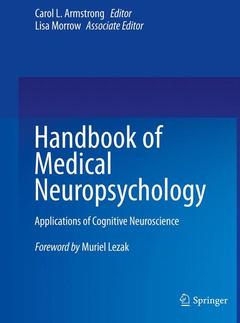Description
Handbook of Medical Neuropsychology, 2010
Applications of Cognitive Neuroscience
Coordinators: Armstrong Carol L., Morrow Lisa
Language: English
Subjects for Handbook of Medical Neuropsychology:
Publication date: 04-2012
564 p. · 19.3x26 cm · Paperback
564 p. · 19.3x26 cm · Paperback
Description
/li>Contents
/li>Biography
/li>Comment
/li>
This handbook celebrates the abundantly productive interaction of neuropsychology and medicine. This interaction can be found in both clinical settings and research l- oratories, often between research teams and clinical practitioners. It accounts for the rapidity with which awareness and understanding of the neuropsychological com- nents of many common medical disorders have recently advanced. The introduction of neuropsychology into practice and research involving conditions without obvious neurological components follows older and eminently successful models of integrated care and treatment of the classical brain disorders. In the last 50 years, with the growing understanding of neurological disorders, neuropsychologists and medical specialists in clinics, at bedside, and in laboratories together have contributed to important clinical and scienti c advances in the und- standing of the common pathological conditions of the brain: stroke, trauma, epilepsy, certain movement disorders,tumor, toxic conditions (mostly alcohol-related), and degenerative brain diseases. It is not surprising that these seven pathological con- tions were the rst to receive attention from neuropsychologists as their behavioral symptoms can be both prominent and debilitating, often with serious social and economic consequences.
Primary Nervous System Disease.- Epilepsy and Cognitive Plasticity.- Traumatic Brain Injury.- Neuropsychological Problems in Neuro-oncology.- Multiple System Atrophy, Orthostatic Hypotension, and Autonomic Dysfunction and Cognition.- Vascular System Disease.- Cardiovascular Disease and Neurocognitive Function.- Cerebrovascular Disease and Disorders.- Cognitive Declines During Migraine and Cluster Headaches Are Caused by Cerebral 5HT Neurotransmitter Dysfunction.- Respiratory Disorders: Effects on Neurocognitive and Brain Function.- Developmental, Genetic, and Structural Disorders.- Cerebral Palsy: Effects of Early Brain Injury on Development.- Autism and Asperger’s Syndrome: A Cognitive Neuroscience Perspective.- Genetic Syndromes Associated with Intellectual Disabilities.- An Introduction to Hydrocephalus: Congenital and Late-Life Onset.- Learning Disabilities.- Frontal Lobe Disorders in Pediatric Neuropsychology: Attention-Deficit Hyperactivity Disorder and Tourette Disorder.- Aging.- Dementia.- Theoretical Perspectives on Cognitive Aging.- Neuropsychology of Movement Disorders and Motor Neuron Disease.- Immune-Mediated Disease.- Cognitive and Affective Neuroscience Theories of Cognition and Depression in Multiple Sclerosis and Guillain–Barré Syndrome.- Neurocognitive Function in Systemic Autoimmune and Rheumatic Diseases.- HIV–AIDS: The Neurologic and Cognitive Consequences of HIV-1 Infection.- Rheumatologic Conditions: Sjögren’s Syndrome, Fibromyalgia, and Chronic Fatigue Syndrome.- Endocrine Disease.- Neuropsychological Sequelae of Type 1 and Type 2 Diabetes.- Neuropsychological Functioning of Endocrinology Disorders: Gonadotropic Hormones and Corticosteroids.- Neuropsychological Assessment of Posttraumatic Stress Disorder (PTSD).- Metabolic Disease.- Hepatic Encephalopathy.- Toxic Disorders and Encephalopathy.- Neurocognition in Mitochondrial Disorders.- Rehabilitation.- Current Approaches to Cognitive Rehabilitation.- Sensory Reweighting: A Rehabilitative Mechanism?.
Carol L. Armstrong is a neuropsychologist conducting cognitive neuroscience research. Her long-term interests are the study of memory and attention, and the cognitive processes affected by white matter disease or injury. Investigations have focused on resource-limited memory and attention processes, and on the structural distribution of the white matter measure in normal and injured brains. Recent investigations include the longitudinal damaging effects of radiotherapy and brain tumors in both children and adults, as shown by longitudinal, prospective studies of cognition and neuroimaging of white matter integrity, and response of the hippocampus to radiotherapy. Current studies are being conducted on the functional and structural significance of cerebellar connections with the cortex.
Features the most up-to-date information on cognitive neuroscience to enhance the work of the practitioner Presents a wide scope of topics, including aspects of neuropsychology Coverage includes neuropsychology of infectious diseases, genetic disorders, endocrine disorders, nutrition-based syndromes, neuro-oncology, structural abnormalities, and stress disorders Includes supplementary material: sn.pub/extras
© 2024 LAVOISIER S.A.S.




